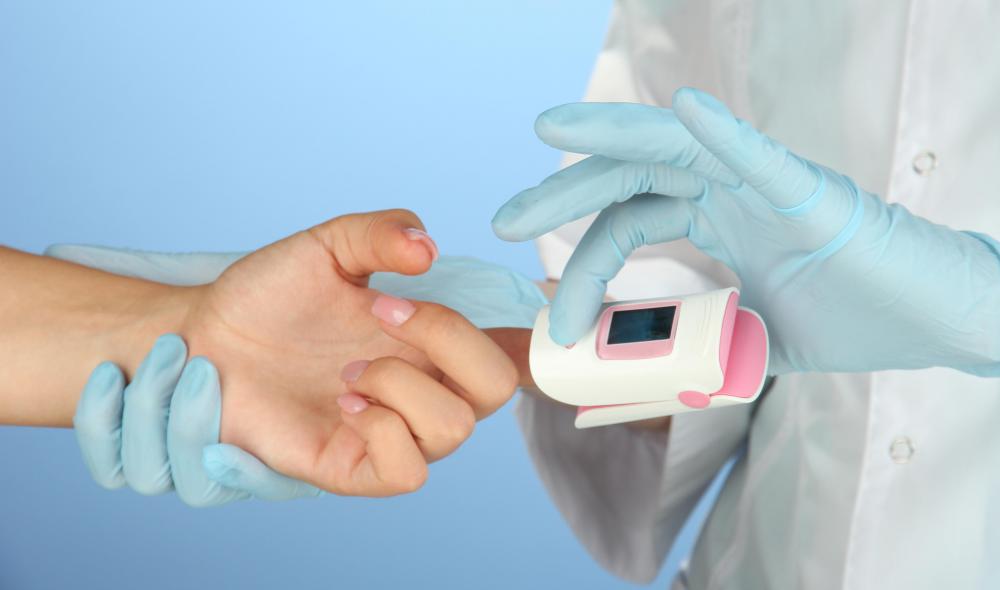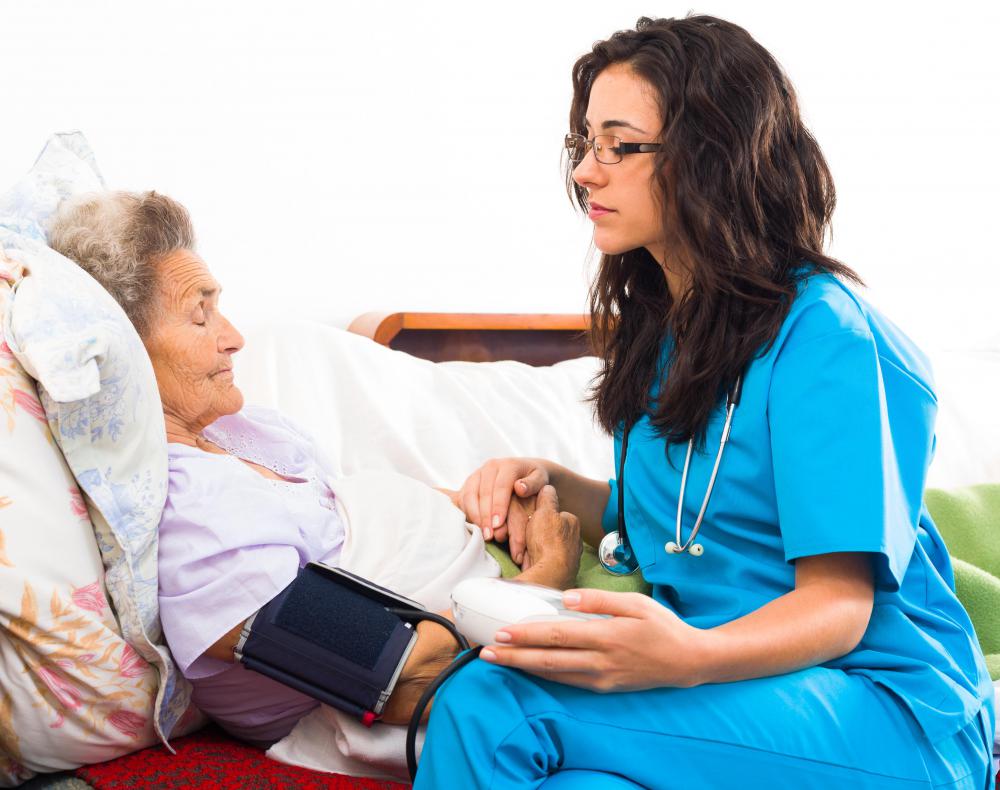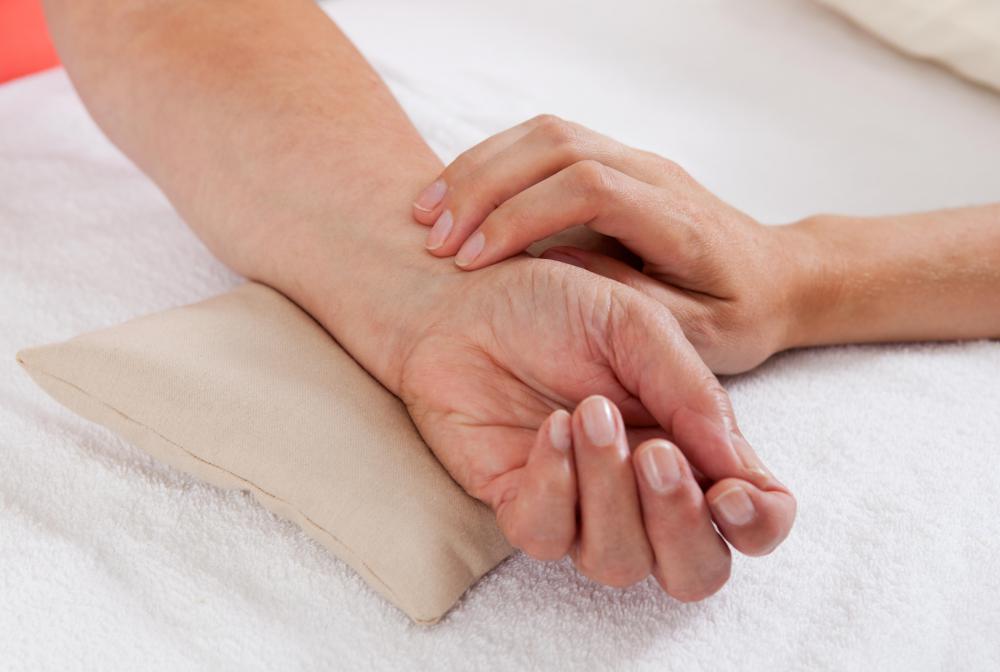At WiseGEEK, we're committed to delivering accurate, trustworthy information. Our expert-authored content is rigorously fact-checked and sourced from credible authorities. Discover how we uphold the highest standards in providing you with reliable knowledge.
How do I Become a Telemetry Nurse?
When you become a telemetry nurse, you will work with acutely ill patients. A telemetry nurse's main duties are to connect and monitor machines that keep track of vital signs, such as heart rate and blood pressure. He or she also interprets the readings from these machines so that the health care team can assess the patient's condition.
This nursing specialty puts you at the forefront of advanced medicine and patient care. The work that telemetry nurses perform is a vital part of the patient spectrum of care and healing. Typically, the majority of telemetry nurses work in a hospital's Progressive Care Unit.

To become a telemetry nurse, you first need to complete a bachelor’s degree, usually the Bachelor of Science in Nursing (BSN) in the United States. To fulfill the requirements for this degree, you will complete courses in math and science, including anatomy, chemistry, biology, psychology, and nutrition. Most undergraduate nursing degree programs also require clinical internships in hospitals or other health care facilities before graduation.

Upon graduation, you must take the National Council Licensing Examination (NCLEX) to become a licensed registered nurse (RN) in the US. Some states have additional licensing requirements beyond the NCLEX exam. You must meet these too before you can practice nursing and work in that state.
The American Association of Critical-Care Nurses (AACN) sets the national guidelines for the path from RN to telemetry nurse. The AACN Certification Corporation administers the Progressive Care Certified Nurse (PCCN) exam that RNs take to fulfill the certification requirements for this nursing specialty. Telemetry is one of several specialties that fall under the PCCN exam.

To qualify to take the exam, you must have a valid RN license and 1,750 hours of bedside nursing experience with acute or critically ill patients within the two years preceding your application. You must have worked at least 875 hours during the year prior to your exam. RN's who have satisfied this requirement in the United States and in Canadian health care facilities qualify.

AACN also accepts certification applications from RNs who gained their work experience at foreign facilities that meet the US standard of nursing practice for this specialty. These institutions must have AACN Magnet Status or accreditation from the Joint Commission International. Telemetry nurse certification candidates register to take the exam and pay the fees through the AACN online portal. Exam review courses, study guides, example questions, and advice from currently certified nurses help candidates prepare to pass the telemetry certification exam.
AS FEATURED ON:
AS FEATURED ON:

















Discussion Comments
@JaneAir - That's true. After all, if a doctor has no idea there's something wrong with the patient, how can they be expected to respond?
That being said, I feel like being a telemetry nurse must be kind of stressful. You basically deal with life and death every single day.
I think it's great that nurses have to have some experience working as nurses and take a specialized exam before working as a telemetry nurse. It sounds like a really serious specialty.
Since these nurses are working with acutely ill patients, it seems like it's really important to make sure all the equipment monitoring the patients is set up correctly. If a machine is giving incorrect readings because of a set up error, that could mean that a doctor doesn't get to a patient in time if there's a problem.
@starrynight - You're right, there are a ton of specialties in nursing. You can work in the ER, work in a doctors office, or even be a NICU nurse. However, it's hard to pick a specialty before you actually get experience in the field. I have a friend who is a nurse, and she told me that having clinical experiences is much more enlightening than just reading about the different fields online.
@anon133069 - You're right, there's a ton of great information about the nurse role online. I've been thinking about going back to school for nursing, so I've been doing a ton of research to try and find out everything I can about the field before I commit myself to going back to school for it.
Before I started researching, I had no idea there were specialties in nursing that required an exam past the basic exam everyone takes to get their license as a RN. But the nursing field is really very broad and nurses have a lot of options about where to work.
The online school that I attended had a general overview of working and getting involved in the Telemetry field. While this information is all correct here, and well written, and well organized you can also read more about this field online.
Good luck if you decide to work in this field. It can be very challenging.
Post your comments